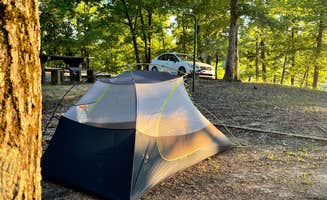Tent campsites near Tupelo, Mississippi are primarily concentrated in the surrounding Holly Springs National Forest and along the historic Natchez Trace Parkway. The region experiences hot, humid summers with temperatures regularly exceeding 90°F and mild winters where nighttime temperatures can drop into the 30s. Most camping areas remain primitive with limited cell service throughout the forest and parkway corridors.
What to do
Fishing from lakeside docks: At Puskus Lake, campers can fish directly from well-maintained docks. "The docks nice, wide with bench seating," notes camper Alex B., who adds that some sites are positioned with "a dock right in front of it, could park kayaks and or a boat."
Kayaking on forest lakes: Small watercraft provide access to quiet coves and fishing spots throughout the area. David H. describes Puskus Lake as perfect for a "quick trip to paddle around in kayak, fish & enjoy great meal over grill."
Hiking forest trails: Several short hiking paths surround the camping areas, though maintenance varies seasonally. "There are 2 trails you can walk on around the campsite but they only equal about 5 miles and are not maintained very well in some areas although they are flat and easy to explore," explains Kim N. about trails near Puskus Lake.
Wildlife observation: The national forest setting offers opportunities to observe native species, though campers should practice caution. Justin Y. advises visitors to Puskus to "Be mindful of snakes and your usual pests."
What campers like
Seclusion from crowds: Many campgrounds in the area provide quieter alternatives to more developed sites. "We've frequented this small space since childhood. It's very well remote off of HWY 30 in the Holly Springs National Forest," writes Justin Y. about Puskus Lake.
Affordable camping options: National forest campsites maintain lower fees than many commercial alternatives. Alex B. notes that Puskus Lake is a "NF camp, so $7 for regular people, and $3.50 for those awesome folks with an interagency pass."
Waterfront tent sites: Several campgrounds feature sites positioned close to water. "Wonderful sunset, most sites are around 100-50 feet from the water," describes Alex B. about the lakeside positioning at Puskus Lake.
Low occupancy midweek: For those seeking solitude, weekday camping often means few neighbors. Dexter I. shares that during his visit to Puskus Lake, "I was the only one there with the exception of two others fishing out on the lake."
What you should know
Bathroom limitations: Toilet facilities throughout the area are minimal and may require planning. At Puskus Lake, campers report that "One bathroom away from the sites in the 'day use' area" and advise to "bring your own TP."
Seasonal water availability: Drinking water access fluctuates throughout the year. Natalee F. reports, "The water spout did not work on my visit" at Puskus Lake, making it essential to bring sufficient water supplies.
Self-registration process: Most sites require campers to handle their own check-in. Justin Y. explains that at Cox Lake, "Self check in is handled at the permit box upon turning off the highway."
Weekend crowding: Expect higher occupancy Friday through Sunday. "I camped here just one night in May 2021 on a Saturday, I got there at about 3pm and was the first there but by nightfall every site was full," reports Natalee F. about Puskus Lake.
Litter at some locations: Maintenance levels vary between camping areas. Kelly C. describes Cox Lake as having a "Lake area is nice enough, but lots of litter and shot gun shells."
Tips for camping with families
Bring activities for children: Limited formal recreation facilities means packing your own entertainment. One camper at Graham Lake notes it's "rather nice there" but reminds that "No hookups. Nothing."
Select weekdays for quieter experience: Children may enjoy the more peaceful midweek environment. Kim N. observes at Puskus Lake, "I have never seen more than 5 or 6 different sites being used anytime that I have been there."
Prepare for disconnected time: Most camping areas lack connectivity, creating opportunity for unplugged family activities. Hunter H. describes Puskus Lake as "a great location to disconnect, but do not expect the amenities other sites offer (bathrooms, electricity, water, etc.)."
Verify campsite size for family setups: Some areas have spacious sites while others are more limited. Kim N. notes that at Puskus Lake, "the camping spaces have a good amount of room to them so you do not feel like you are on top of each other."
Tips from RVers
Size restrictions for larger vehicles: Many forest roads and camping areas cannot accommodate large recreational vehicles. Steve G. advises about Graham Lake, "This is a very small campground with about 5 spots. Large rigs are a no go I would think, as access can be tight. If you're in a small to medium travel trailer or a tent, this could work out."
Solar considerations for tree coverage: RVers relying on solar power need to select sites strategically. Bryce K. suggests, "If you have solar or starlink pick your spot wisely as a lot have a ton of trees."
Limited dump station availability: Servicing facilities are scarce in the area, requiring planning for longer stays. Many sites, like Graham Lake, are described as having "No hookups. Nothing."
Best spots for self-contained setups: Boondocking capable RVs have more options. Steve G. describes Graham Lake as potentially suitable: "Boondocking? This one might work."


